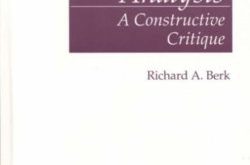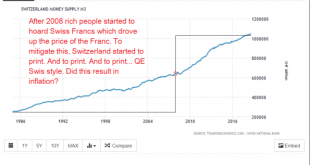from Lars Syll As a descriptive exercise, all is well. One can compare the average salary of men and women, holding constant potential confounders. The result is a summary of how salaries differ on the average by gender, conditional on the values of one or more covariates. Why the salaries may on the average differ is not represented explicitly in the regression model … Moving to causal inference is an enormous step that needs to be thoroughly considered. To begin, one must ponder …...
Read More »Globalization checkmated?
from Thomas Palley and current issue of the RWER Economic failings and the rise of politics It has been ten years since the financial crisis. Since then, the global economy has recovered and attention has increasingly shifted to political risks as the trigger for the next economic crisis. That shift of attention has been driven by political events like the UK’s Brexit referendum, the election of President Trump, and the rise of anti-euro populist political parties in Italy. Such events...
Read More »Trump’s tariffs on Chinese imports are actually a tax on the US middle class
from Dean Baker In his escalating trade war with China, Donald Trump is acting increasingly like Captain Queeg in the Caine Mutiny. He has imposed a 10 percent tariff on $200 billion in US imports from China, a rate he proposes to increase to 25 percent at the start of the next year. He also is threatening tariffs on the rest of our imports from China, an additional $300 billion in goods and services. The straight arithmetic tells us that 10 percent of $200 billion is $20 billion on an...
Read More »QE and inflation (not), Swiss edition. Two graphs.
Graph 1. Printing Francs to satisfy external demand for Francs led to a fast increase of the amount of money in Switzerland. Did this lead to inflation? After 2008 rich people from all over the globe started to buy Swiss Francs. This, of course led to appreciation of the Swiss Franc. The Swiss national bank didn’t like this: bad for exports. And, related to this but much worse, structural lower demand for export products of a small country like Switzerland will erode the manufacturing...
Read More »Models and Reality
from Asad Zaman Linked below is a 95m Video Lecture on the previous post on “Simple Model Explains Complex Keynesian Concepts“. In Chapter 2 of General Theory, Keynes has two points against the classical theory of the labor market. He points out that laborers react strongly (with strikes) against wage cuts, but show no similar reaction to inflation. This means that the decision to supply labor does not depend on the real wage — instead it must depend only on the nominal wage. The SECOND...
Read More »When should we believe the unconfoundedness assumption?
from Lars Syll Economics may be an informative tool for research. But if its practitioners do not investigate and make an effort of providing a justification for the credibility of the assumptions on which they erect their building, it will not fulfil its task. There is a gap between its aspirations and its accomplishments, and without more supportive evidence to substantiate its claims, critics — like yours truly — will continue to consider its ultimate arguments as a mixture of rather...
Read More »Socialism, economics, and the Left
from David Ruccio Last month, Alexander Beunder, the editor of Socialist Economist, asked a handful of “expert economists from around the world”—including Johanna Bockman, Prabhat Patnaik, Andrew Kliman, and myself—two key questions concerning the problems and prospects for socialism, economics, and the Left in the world today. Beunder requested that we keep our answers to two hundred words. Our answers are now posted on-line, which can be read by clicking on the links below. Here are...
Read More »Getting serious about debt and deficits: the deficit hawks did enormous harm to our kids
from Dean Baker Debt and Deficits, Again With the possibility that the Democrats will retake Congress and press demands for increased spending in areas like health care, education, and child care, the deficit hawks (DH) are getting prepared to awaken from their dormant state. We can expect major news outlets to be filled with stories on how the United States is on its way to becoming the next Greece or Zimbabwe. For this reason, it is worth taking a few moments to reorient ourselves on...
Read More »The subtleties of effective demand
from Asad Zaman As I read more and more about effective demand, I got more and more confused — how can I explain this concept to my poor students, if I don’t understand it myself? There are a huge number of articles with different and conflicting views and interpretations of this concept, which Keynes describes as being central to his theory. Let me proceed to clarify the insights that have resulted from struggling with this material, and going through many iterations of revisions in...
Read More »Re-examining economic laws
from Lars Syll In mainstream economics, there is a lot of talk about ‘economic laws.’ The crux of these laws that allegedly do exist in economics, is that they only hold ceteris paribus. That fundamentally means that these laws only hold when the right conditions are at hand for giving rise to them. Unfortunately, from an empirical point of view, those conditions are only at hand in artificially closed nomological models purposely designed to give rise to the kind of regular associations...
Read More » Real-World Economics Review
Real-World Economics Review




